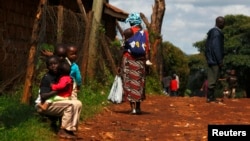JOHANNESBURG —
The African continent has some of the fastest growing economies in the world, but that growth is not translating into lower rates of poverty.
A new survey by Afrobarometer, an independent research project that measures the social, political and economic atmosphere in Africa, shows that the majority of Africans are still deprived of the basics -- clean water, food, cooking fuel and medicine.
Afrobarometer says poverty levels have barely improved in the past decade despite an average five percent growth in gross domestic product in the same period. This, according to its latest public opinion survey conducted in 34 African countries between October 2011 and June 2013.
Some 76% of the more than 50,000 people surveyed reported that they had gone without cash income at least once in the previous year. Shortage of food and clean water also haunts the poor here with almost half saying they had gone without food or clean water once or several times in the past year. One out of every two Africans also struggled to get medical care.
Presenting its survey findings in Johannesburg this week, researchers said that while problems are most entrenched in East and West Africa, even countries with strong economies are not immune.
That should be a a wake-up call to governments where poverty levels have actually increased in South Africa and Botswana, said Robert Mattes, a professor at the University of Cape Town in South Africa.
“Based on that one might say, with all the levels of growth that have been reported across the continent, with all the kind of intervention that donors have made to bring down poverty, that there has not been much to speak on in the areas of success," Mattes said.
Citizens of Togo, Burundi, Guinea, Niger and Senegal experience the highest levels of poverty, while people in Mauritius and Algeria report the lowest.
The Africans surveyed overwhelmingly failed their governments on economic management, with 69% dissatisfied with job creation and 76% not happy with efforts to narrow income gaps.
According to Afrobarometer, the survey suggests that either growth rates are not being accurately reported or economic growth is not trickling down.
Researchers recommend that the only way to reduce poverty levels is more investment in basic infrastructure, such as piped water and electricity along with education and accessible medical care.
A new survey by Afrobarometer, an independent research project that measures the social, political and economic atmosphere in Africa, shows that the majority of Africans are still deprived of the basics -- clean water, food, cooking fuel and medicine.
Afrobarometer says poverty levels have barely improved in the past decade despite an average five percent growth in gross domestic product in the same period. This, according to its latest public opinion survey conducted in 34 African countries between October 2011 and June 2013.
Some 76% of the more than 50,000 people surveyed reported that they had gone without cash income at least once in the previous year. Shortage of food and clean water also haunts the poor here with almost half saying they had gone without food or clean water once or several times in the past year. One out of every two Africans also struggled to get medical care.
Presenting its survey findings in Johannesburg this week, researchers said that while problems are most entrenched in East and West Africa, even countries with strong economies are not immune.
That should be a a wake-up call to governments where poverty levels have actually increased in South Africa and Botswana, said Robert Mattes, a professor at the University of Cape Town in South Africa.
“Based on that one might say, with all the levels of growth that have been reported across the continent, with all the kind of intervention that donors have made to bring down poverty, that there has not been much to speak on in the areas of success," Mattes said.
Citizens of Togo, Burundi, Guinea, Niger and Senegal experience the highest levels of poverty, while people in Mauritius and Algeria report the lowest.
The Africans surveyed overwhelmingly failed their governments on economic management, with 69% dissatisfied with job creation and 76% not happy with efforts to narrow income gaps.
According to Afrobarometer, the survey suggests that either growth rates are not being accurately reported or economic growth is not trickling down.
Researchers recommend that the only way to reduce poverty levels is more investment in basic infrastructure, such as piped water and electricity along with education and accessible medical care.




